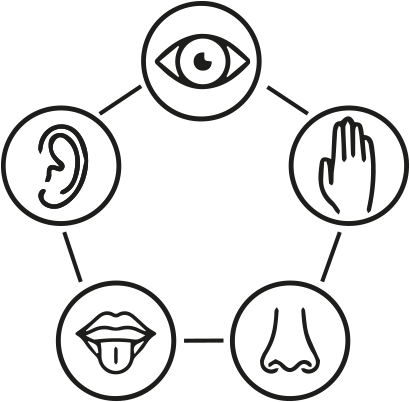Manifesto - Senses-Based Learning
Senses-based learning – a definition
Senses-based learning is a pedagogical methodology for tertiary education focusing on exploring and developing sensory skills and critically reflecting on their importance in research and professional practice.
Senses-based learning aims to re-balance and reassert the importance of sensory skills in tertiary education and in professional practice. Our approach to senses-based learning is through interventions in existing curriculum, either adding new elements or enhancing existing ones. The interventions can take the shape of specifically designed learning units (courses, electives or part of courses), learning resources (physical or digital presented in our Sensory Learning Lab), activities, specifically designed internships, etc. Because of the nature of the interventions, they can easily be integrated in existing curricula and with blended and digital learning.
We believe:
1) Sensory skills are essential to research and professional practice
From Medicine to Museum studies, from Physical Computing to Chemistry, from Botany to Archeology (to name just a few) most researchers and professionals are being trained to become, before all, expert observers. It is this capacity to detect symptoms, to evaluate the impact of light and smell on museum visitors or to distinguish between two textures of similarly shaped leaves that is essential to their training. The education of these experts involves attuning, developing and sharpening their senses.
2) Sensory skills need to be specifically, explicitly and critically taught, trained and evaluated in a tertiary context
At best, in tertiary education, these skills are taken for granted and not specifically catered for or evaluated in physical classes. It is the assumption that students will ‘pick it up’ as they go to class, attend labs or workshops, make site visits or do internships. At worst, students learn in their studies to distrust their senses and follow protocol. In the case of digital learning, these skills are further side-lined and, when present at all, focus on vision, and occasionally listening, rather than multiple (and connected) senses. Sensory skills should instead be intentionally part of curricula across all fields.
3) Senses-based learning enhances tertiary education
Senses-based learning offers an education that is contextual (that is, that prioritizes real-life environments), interdisciplinary and transferable. It also promotes constructive learning as the students develop these skills as well as their ability to communicate and reflect critically on their sensory experiences.
4) Senses-based learning helps develop attentional awareness
The reflective and critical learning of senses–based learning is supported by students developing an ability to slow down and make better decisions. Indeed, the attention given to senses education aims to prevent learners from making quick decisions and instead analyze, deconstruct and slow down their thought process. The ultimate aim is to avoid inattentional blindness and to help students develop an attentional awareness.
5) Senses-based learning serves more diverse students
Senses-based learning is self-directed, student-centered and serves a greater diversity of students (depending on their learning preferences and range of abilities). Because it prioritizes different sensory skills beyond sight and sound alone, students who have less conventional ways of learning may find an alternative and comfortable learning environment.
6) Senses-based learning can enhance digital learning
Senses-based learning is digital compatible, we do not see the senses and the digital as separate. Senses based learning can be incorporated in blended or hybrid teaching situations through simple interventions.
